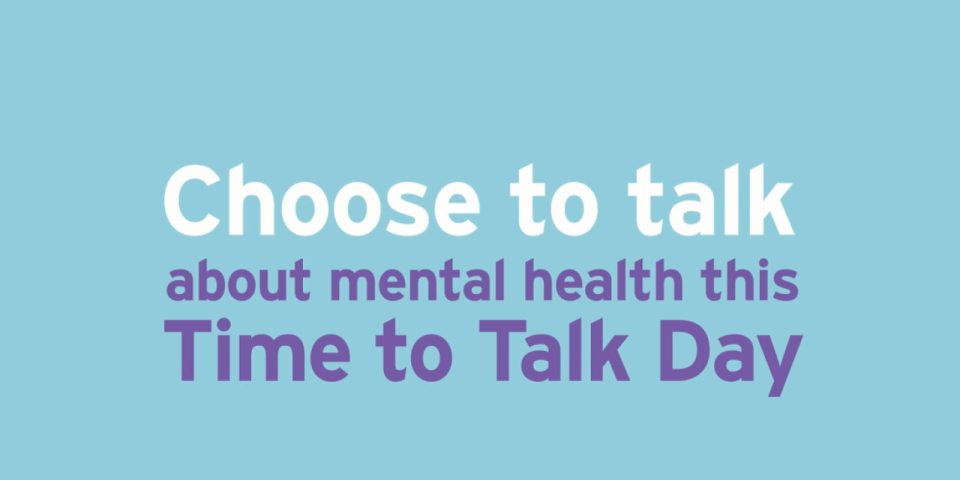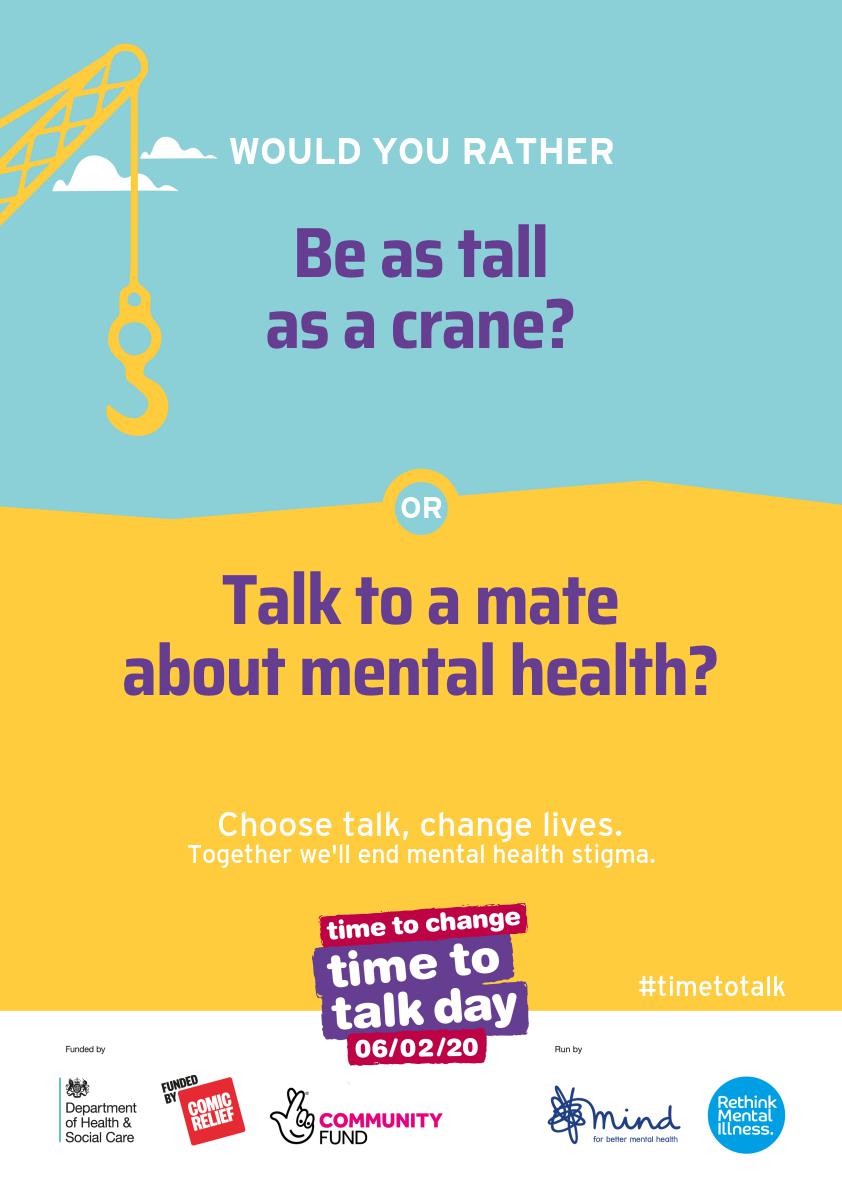Latest News
Time to Talk: Why Mental Health First Aid is Vital in Any Workplace
Posted on Friday, 7th February 2020

Yesterday was Time to Talk Day 2020. This annual campaign is dedicated to starting a national conversation about mental health. Despite the fact that a quarter of people in the UK suffer from some form of mental health problem, the topic is still seen as taboo by many parts of society. People can often feel uncomfortable talking about mental health, and don’t know what to say or how to help those struggling around them. In today’s blog we look at Time to Talk and how mental health first aid can make a huge difference to workers' lives…
What is Time to Talk?
Time to Talk is a social movement set-up to change the way we think about mental health. They focus on improving mental health discussions in workplaces.
Time to Talk’s main aim is to end the stigma around mental health. Stigma is one of the biggest barriers people face when struggling with mental health issues, as they are afraid to open up and talk about their problems. Keeping their issues bottled up can make their mental state much worse, potentially driving them to unhealthy coping mechanisms such as drugs and alcohol.
Time to Talk Day encourages everyone to be more open about mental health; to talk, to listen, and to be part of the conversation. The campaign aims to combat the awkwardness people feel around mental health. Although the official day has passed for this year, it is not too late to start the dialog. Their website provides multiple tips, advice and resources for helping to start the conversation with colleagues, friends or family: https://timetotalkday.co.uk/
Creating environments where it is possible to have open conversations about mental health is of vital importance in the workplace. One of the best ways for you to be able assist those suffering at work is with the appropriate training...
 What is Mental Health First Aid?
What is Mental Health First Aid?
At ESS, we are proud to be delivering a range of mental health training courses to help workplaces improve their workers' wellbeing. Recently, we have started delivering our new Mental Health First Aid course. Our Senior Training & Consultancy Manager John Wright heads up our Mental Health First Aid training and believes it is an essential part of health and safety in any workplace:
“Mental health first aid is a way of ensuring workers are of sound body and mind for when they’re in the workplace. A lot of people don’t understand what mental health is. Everybody knows about the physical toll of work, but don’t appreciate the mental strain it can have on people.
Everybody in the working world has issues with mental health, but some people suffer more than others. That’s what we call ‘mental ill-health’. There’s lot of people from all walks of life suffering forms of mental ill-health, be that anxiety, depression, food disorders or addictions.”
What is the impact of mental illness in the workplace?
Ensuring the correct resources are available for staff suffering from mental ill-health is not just a moral responsibility, it can have serious financial repercussions for organisations. A significant number of absences in workplaces are a direct result of mental health issues. Depression, stress and anxiety can all build up to the point where staff are physically and mentally incapable of working.
Losing workers to illness is obviously a huge problem for businesses. It will leave the organisation either understaffed or forced into hiring additional staff to cover. Spotting and addressing these mental health issues early can prevent the issues getting more serious and save companies money in the long-run.
Is mental health first aid a legal requirement?
At the time of writing, mental first aid is not a legal requirement. However, this is likely to change sooner rather than later. There is currently a ‘mental first aid in the workplace’ bill being debated in the Houses of Parliament. It has cross-party support and is likely to be introduced as a legal requirement in the not-so-distant future.
Many organisations may want to pre-empt the result of the parliamentary debate by getting their staff trained now. Not only would your staff and organisation as a whole benefit from the knowledge gained on the course, it would also mean avoiding any rush to get trained if it does become a legal requirement.
Why do I want to be a mental health first aider?
Being able to spot the signs of mental ill-health is a valuable skill for any worker in any workplace. Not only does it allow them to look out for their colleagues, but it will also mean they can better understand their own mental health. John Wright believes this course can be a rewarding experience, and an increased knowledge of mental health is essential to save lives:
“Construction mental health charity The Lighthouse Club have released the statistic that, on average, two people a day commit suicide. Billions of pounds are lost by UK industries every year due to people suffering mental ill-health. These statistics show that as society we need to be doing more to help address these issues in the workplace.
There is still a massive stigma around mental health. If you go off sick with a broken arm, it’s accepted. If you go off with stress, it’s frowned upon as being a weakness. It’s not a weakness, it’s an illness. The problem we face, especially in the construction industry, is that we’re papering over the cracks and not treating the issue seriously enough.“
As John mentioned, mental health is a particularly urgent issue in the construction industry. Male construction workers are three times as likely to take their own life compared to the average worker. For more detailed information on mental health in the construction industry and the support networks available, see our blog looking at the issue in more depth.

What skills do you need to be a mental health first aider?
To become a mental health first aider, there are no specific skills or qualifications you need to have to your name. As long as you have the time, resources and passion to improve your understanding of mental health in order to help colleagues, you will be able to complete the course. John stresses the most important assets for mental health first aiders is having time to help and the ability to listen:
“First aiders are not therapists or doctors, but we can help intervene and support our those around us. The focus of the course is how to identify people who may be suffering from mental ill-health and learn how best to help that individual.
The key thing is developing your ability to listen to people who are reaching out. If you don’t offer support to somebody that is coming to you as a mental health first aider then they are just going to walk away and you’ve lost the opportunity to help that individual. That’s why a lot of construction companies are prioritising mental health first aid in their training.”
Further information
If you want more information about mental health first aid, the MHFA website is a fantastic resource. This website also includes the Every Mind Matters campaign, which aims to create awareness of people’s mental health.
If you want to know more about our courses, you can see a full list of the training we offer here. You can also contact a member of our sales team on 0115 8970 529 or email us at info@essentialsiteskills.com.


